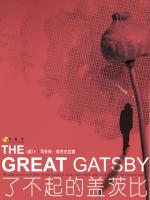Initial Purity Of Human
When it comes to F.S.Fitzgerald, besides Tender In The Night, the opus that sink in must be this universally known literature --The Great Gatsby. It is one of the classics of the world, presenting eternal emotions as other pieces do but in an elaborate, poetic way.
It was emotionally hard for me to read through this book though, in the very beginning. Its narration is so smooth and plain that it can hardly be traceable. Much ink has been spilled describing a sequence of scenes while few judgement is made. Thus, it impresses me with the feeling that too much more remaining unsaid is on the verge of popping out, only that my eyes are not peeled yet.
The story is set in 1920s, a relatively high walk of American whites. The hero of the novel is definitely Gatsby, however, readers just can have a peek at him through Nick’s vague recount in the first part of the book. He was readable and unreadable. He was a mystery. Those dreams, rooted unwaveringly in his heart, were blazing but imaginary. As the writer puts it, ”So I walked away and left him standing there in the moonlight—watching over nothing.”
In my personal perspective, the writer didn’t glorifies or criticize Gatsby himself. He bluffed, trafficed in wine and adorned himself with fictitious tags of high level of society where he didn’t belong in order to qualify himself to match Daisy. There’s no reason to applaud for him as a perfect gentleman.
Whereas I think the point needs to be addressed is Gatsby’s sheer, initial purity of human. “ He knew that when he kissed this girl, and forever wed his unutterable visions to her perishable breath, his mind would never romp again like the mind of God.” Having thrown himself into this enterprise of going after happiness, he held on to this tie ceaselessly, believing in it firmly enough to have made it his personal belief. The green light, no longer a simple twinkle but a symbol, shining above him, navigates him to accomplishing the worth of his being.
Gatsby’s dream, which symbolizes perseverance in pursuing future and loving something responsibly, heart and soul, became real dreams to most of Americans in that period, or wherever history has marched.
The book ends up with the words, “So we beat on, boats against the current, borne back ceaselessly into the past.” With the wheel of history rolling, sheer pursuit for something is incrementally hard to be found. While a majority people lack in it, a minority of people with initial purity of human, are pulling the world together, making sure the left of it is still a spiritual land where we can live on and on.
The words I write down are probably quite shallow and unilateral, because generally speaking, this book is sure not a biography but a reflection of American society. But given the fact that not many of us are historical experts, grasping its beautiful and pure human emotions from a very limited point of view is still something consolatory.
So we review the book, over and over again, treasuring it as our life’s continuance.



 京公网安备 11010802032529号
京公网安备 11010802032529号